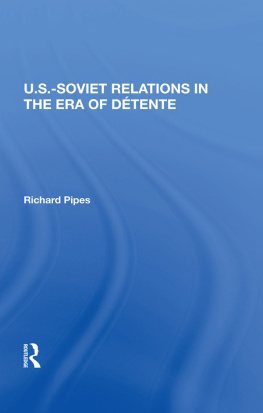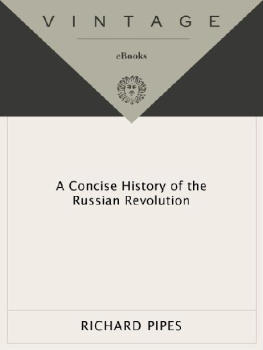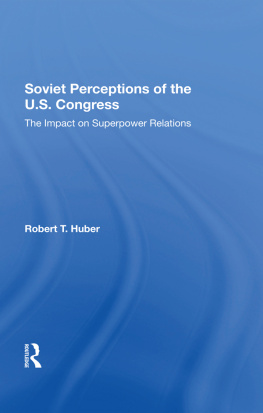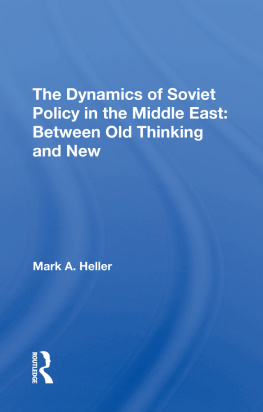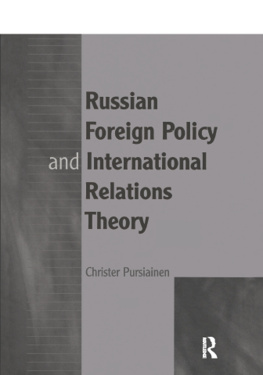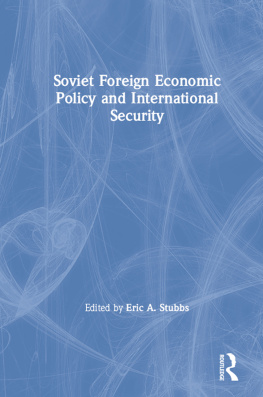U.S.-Soviet Relations in the Era of Dtente
Also of Interest
The Soviet Union in World Politics , edited by Kurt London
The Armed Forces of the USSR , Harriet Fast Scott and William F. Scott
Verification and SALT: The Challenge of Strategic Deception , edited by William C. Potter.
The Domestic Context of Soviet Foreign Policy , edited by Seweryn Bialer
Securing the Seas: The Soviet Naval Challenge and Western Alliance Options , Paul H. Nitze, Leonard Sullivan, Jr., and the Atlantic Council Working Group on Securing the Seas
The Angolan War: A Study in Soviet Foreign Policy in the Third World , Arthur Jay Klinghoffer
China, the Soviet Union, and the West: Strategic and Political Dimensions in the 1980s , edited by Douglas Stuart and William T. Tow
Atlas of Soviet Affairs , Robert N. Taaffe and Robert Kingsbury
The Soviet Union in the Third World: Successes and Failures , edited by Robert H. Donaldson
World Power Trends and U.S. Foreign Policy for the 1980s , Ray S. Cline
Arms Control and Defense Postures in the 1980s , edited by Richard Burt
The War System: An Interdisciplinary Approach , edited by Richard A. Falk and Samuel S. Kim
The Military Balance 19801981 , International Institute for Strategic Studies
Available in hardcover and paperback
About the Book and Author
U.S.-Soviet Relations in the Era of Dtente
Richard Pipes
Americans tend to view peace as a normal state, occasionally interrupted by war, which should be ended as quickly as possible to return to normalcy. The Soviet Union, according to eminent Harvard historian Richard Pipes, may have a very different view of both peace and war, believing that peace is merely an interlude between wars, perhaps a time to arm and plan for the next war. The implications of these differing views for understanding dtente, he says, are vast. The United States may well be totally misinterpreting Soviet intentions in dtente.
This volume is a collection of eight of Dr. Pipess most important papers on Soviet foreign policy, concentrating on the constants that form the bedrock of Soviet policy, its psychological, historical, and cultural foundations, its techniques, and the Soviet variant of a policy of dtente. Dr. Pipes is convinced that a grand strategy underlies the foreign and military policies of the Soviet Union and that the roots of that strategy are deeply embedded in Russian history.
Dr. Pipess papers reflect his perceptions of the Soviets relationship with the rest of the world. That his assertions may be correct is shown by a recent presidential directive indicating that the United States is beginning to see that the USSR may indeed have a strategy for winning a nuclear war, while past U.S. actions have been based on a firm belief that the Soviets were convinced that neither superpower could do more than assure mutual destruction.
Richard Pipes is Baird Professor of History at Harvard University and is a prominent writer on the Soviet Union. He was director of Harvards Russian Research Center from 1968 to 1973 and served in various consulting capacities in Washington, D.C., during the 1970s.
First published 1981 by Westview Press
Published 2019 by Routledge
52 Vanderbilt Avenue, New York, NY 10017
2 Park Square, Milton Park, Abingdon, Oxon OX14 4RN
Routledge is an imprint of the Taylor & Francis Group, an informa business
Copyright 1981 by Richard Pipes
All rights reserved. No part of this book may be reprinted or reproduced or utilised in any form or by any electronic, mechanical, or other means, now known or hereafter invented, including photocopying and recording, or in any information storage or retrieval system, without permission in writing from the publishers.
Notice:
Product or corporate names may be trademarks or registered trademarks, and are used only for identification and explanation without intent to infringe.
Library of Congress Cataloging in Publication Data
Pipes, Richard.
U.S.-Soviet relations in the era of dtente.
Includes bibliographical references and index.
1. United StatesForeign relationsRussia. 2. RussiaForeign relationsUnited
States. 3. Dtente. I. Title.
E183.8.R9P48 327.73047 80-27121
ISBN 13: 978-0-367-21264-3 (hbk)
Linguists identify a category of words that they call false friends. They apply this term to words that are alike in appearance and sound but that mean different things in different languages. The treachery of false friends was vividly brought home to me years ago when I was learning Russian and discovered that zapomnit , which in my native Polish meant to forget, in Russian meant to remember.
The essays that follow were written during the decade of dtente, a diplomatic term that in political application has proven to be the falsest of friends. When given fresh currency by de Gaulle around 1958, it was used to describe the first step of a process that was to lead through entente to cooperation between the eastern and western halves of Europe. For de Gaulle, dtentes main by-product was to have been the dissolution of the two great military blocsNATO and the Warsaw Pact with the resultant restoration of political independence to continental Europe. In Germany, where it was adopted in the guise of Ostpolitik , dtente came to stand for the abandonment of the Hallstein Doctrine (with its insistence on national reunification) in exchange for opportunities to engage in diplomatic and economic relations with Eastern Europe. In both instances, dtente was invoked as a device to broaden the room for political maneuverability.
This was not the case with the so-called superpowers. The United States had begun cautiously to edge toward a relaxation of tensions with the USSR in the mid-1950s when Stalins heirs first hinted at abandoning the cold war in favor of peaceful coexistence. The meetings held at Camp David in 1959 between President Eisenhower and Nikita Khrushchev inaugurated an American-Soviet dialogue that, even if it did not produce immediately any concrete results, helped to improve the diplomatic climate. During the next decade, however, genuine rapprochement between the two countries was precluded by the Vietnam War, in the course of which Moscow provided massive military assistance to Americas enemies. Even so, the 1960s saw a steady thaw that prepared the ground for the series of treaties and accords that under President Nixon were formally to commit the United States to the policy of dtente.
The main impetus driving the two powers toward better relations was the specter of nuclear war. At the time of the Camp David encounter, the United States and the Soviet Union each were in possessioiv of thermonuclear warheads and the vehicles for their delivery against each others territory. Both also had underway crash programs to greatly enlarge their arsenals of nuclear warheads and delivery vehicles. Unregulated armament programs carried out in an atmosphere charged with hostility, such as had prevailed in the era of the cold war, threatened total devastation. Common sense dictated that the powers capable of inflicting such destruction on each other, and on much of the world besides, at the very least should attempt to set procedures for regulating their differences as well as limiting the construction of nuclear weapons. This view, adopted by the leadership of the two countries, lent their dtente a much grander purpose than was the case with de Gaulles and Brandts more modest initiatives.

